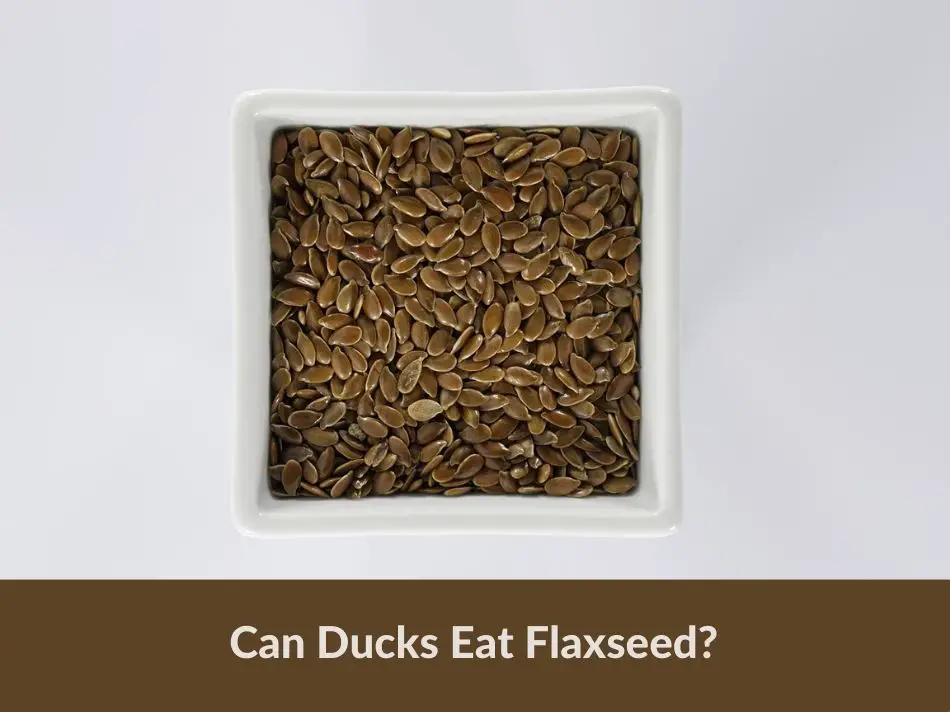Ducks are generally omnivorous, meaning they eat a variety of foods including grains, plants, small fish, and insects. Their diet can vary based on their environment, whether they are wild or domesticated, and the season. But, can ducks eat flaxseed?
Yes, ducks can indeed eat flaxseed. They offer a good source of essential nutrients, and it’s a great supplement to a duck’s regular diet when given in moderation. It’s rich in omega-3 fatty acids, protein, and fiber, making it a nutrient-dense choice.
In this article, we’ll talk more about ducks eating flaxseed, how often to feed it to them, and its health benefits. We also cover the suitability of flaxseed for ducklings and provide a step-by-step guide on how to properly feed this nutrient-dense seed to ducks.
How Often Can I Feed My Ducks Flaxseed?
Flaxseed can be offered to ducks as a treat or a supplement, but it shouldn’t make up more than 10% of their total diet. Offering flaxseeds once or twice a week is more than enough. Like all foods high in fat, moderation is key to maintain a balanced diet.
Can Ducklings Eat Flaxseed?
When it comes to ducklings, it’s advisable to proceed with caution. Ducklings have a more sensitive digestive system and require specialized starter feed for proper growth and development.
If you want to introduce flaxseed, it’s best to wait until they are older and have transitioned to adult feed. Even then, start with a tiny amount and observe for any adverse reactions.
Flaxseed Nutritional Value
Below is the nutritional value of 100 grams of flaxseed.
- Calories: 534
- Protein: 18.3 g
- Carbohydrates: 28.9 g
- Fat: 42.2 g
- Fiber: 27.3 g
It also contains several vitamins and minerals as listed below.
- Thiamine
- Copper
- Molybdenum
- Magnesium
- Phosphorus
Is Flaxseed Healthy for Ducks?
Absolutely! Flaxseed offers several health benefits for ducks. It’s rich in antioxidants, protein, and most notably, omega-3 fatty acids, which contribute to healthy feathers and skin. The high fiber content also aids in digestion.
- Thiamine (Vitamin B1): Thiamine helps ducks convert food into energy and maintain neurological health. A deficiency can lead to low energy and neurological issues.
- Copper: Copper is crucial for blood formation and nerve function. It also affects feather pigmentation. Lack of copper can result in growth and neurological problems.
- Molybdenum: This trace element activates enzymes essential for digestion and nutrient absorption. A deficiency is rare but could disrupt metabolic balance.
- Magnesium: Magnesium aids in bone development and enzyme function. It’s vital for nerve and muscle health. A deficiency can lead to skeletal issues and nervousness.
- Phosphorus: Phosphorus is vital for bone and teeth development, as well as energy metabolism. Lack of phosphorus can result in brittle bones and reduced mobility.
How To Feed Flaxseed To Ducks
Below is a guide to feeding ducks flaxseeds:
- Choose the Right Flaxseed: Opt for organic, non-GMO flaxseed when possible. You can offer them whole or ground.
- Check for Freshness: Make sure the flaxseed is fresh and free from mold or any foul odor.
- Portion Control: Measure the amount of flaxseed beforehand to ensure it doesn’t exceed 10% of their total diet. A small handful should be sufficient for a group of ducks.
- Water Ready: Before you offer the flaxseed, make sure there is ample fresh, clean water available for the ducks.
- Scatter or Mix: If using whole flaxseeds, you can scatter them on the surface of their water or mix them into their regular feed. Ground flaxseed can be mixed into wet foods like chopped fruits or vegetables.
- Observe: Watch how the ducks react to the flaxseed. Make sure they are eating it and check for any signs of digestive discomfort.
- Gradual Introduction: If this is their first time eating flaxseed, start with a smaller amount and gradually increase it as they get used to it.
- Consult a Vet: If you notice any adverse reactions or if you’re introducing flaxseed to ducklings, it’s advisable to consult a vet for personalized advice.
- Clean Up: Any uneaten flaxseed should be removed after a few hours to prevent it from becoming a breeding ground for bacteria.
More Grains & Vegetables Ducks Can Eat
Ducks can also enjoy a variety of other grains and vegetables as part of a balanced diet. These options are not only nutritious but can add variety to their meals, keeping them engaged and happy. Here are some more grains and vegetables that ducks can eat:
Curious about feeding ducks? Explore our specially curated list of grains and seeds that are perfect for ducks.
Conclusion
Flaxseed is a nutritious and beneficial supplement to a duck’s diet, whether you’re a caretaker of domestic ducks or a park visitor looking to offer a healthier alternative to bread. As with all treats, moderation is key.
Always observe how your ducks react to new foods and consult with a vet if you notice any adverse reactions. Lastly, water is essential; always make sure ducks have access to fresh, clean water, especially when introducing new foods like flaxseed.
Disclaimer: The information in this article is for informational purposes only. I'm not an expert or a veterinarian.


